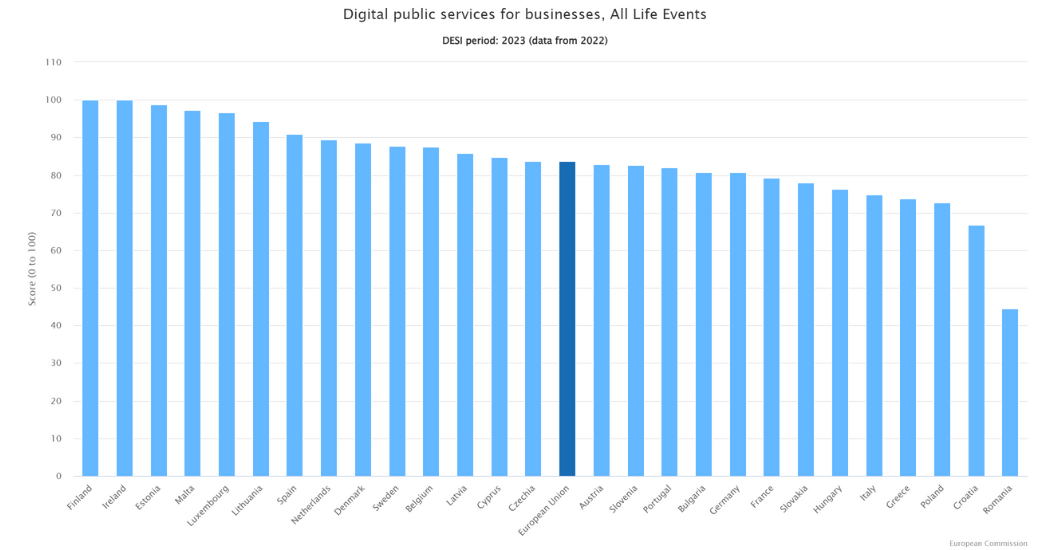The four countries have teamed up to bring together Germany’s political heft with the expertise in digital transformation of the Baltic states and inject fresh impetus into the EU single digital market agenda

Germany, Estonia, Latvia and Lithuania have put forward a series of proposals for the next European Commission to improve the EU’s digital landscape and make it more innovation friendly.
In a paper published late last year, the countries argue the EU’s digital policy needs to be streamlined to improve cross-border services and data sharing, and for better monitoring of the implementation of EU digital policies in each country.
“Europe needs an opportunity-oriented and innovation-friendly digital agenda. Digitalisation must be thought of and shaped holistically. This includes reviewing and consolidating the existing variety of the EU´s digital policy instruments, focussing on their simplification,” says the paper, which is targeted at the new Commission that will be formed after the European elections in June.
This is the first sight of the agenda of the four-country grouping called the Innovation Club, which was formed in February last year by Germany’s digital minister Volker Wissing and the digital or innovation ministries in each of the Baltic states.
“The idea behind it is to bring together the pioneering role of the Baltic states in the field of digitisation with the political weight of Germany,” said Florian Druckenthaner, a spokesman for Germany’s digital ministry. “As the EU's largest economy, Germany has great interest in a consolidated, strong digital single market in Europe.”
All three Baltic states fare well in most metrics of digitisation, which includes factors such as internet and mobile coverage, skills levels and IT training provision, digitisation of public services and the use of digital tools by businesses.
The latest Digital Economy and Society Index (DESI) that ranks EU countries on digitisation puts the three Baltic states ahead of Germany on indicators including the availability of digital public services for companies.

“The Baltic states are particularly innovation friendly because their economic and societal development as well as national security and resilience heavily depends on digital transformation,” said Erika Kuročkina, Lithuania’s vice minister of Economy and Innovation, which is a founding partner in the Innovation Club.
“Our expertise in the digital transformation of the public sector might be of a particular importance for Germany, where sometimes experimenting with offerings of new technological developments in their public sector might be complicated,” Kuročkina said.
From the Baltic states’ point of view, teaming up with Germany, which has one of the largest ICT markets in the world, gives them an amplified voice to shape the EU’s digital policies.
Future proofing
The Innovation Club is proposing nine areas to ensure the EU has a future-proof digital agenda, including a less burdensome digital environment for companies and consumers, actively involving SMEs and start-ups when developing digital services and harmonising access to data generated by the EU.
From the club’s perspective, the EU’s vision of a digital single market is laudable but there needs to be more pragmatic and efficient approaches to reaching this level of interoperability than are currently in place.
The EU launched the second iteration of its 10-year digital agenda in 2020. This includes objectives such as having 75% of companies using advanced technologies, more than 90% of SMEs reaching a basic level of digital intensity and doubling the number of EU start-up companies with a valuation of over $1 billion.
As part of this strategy, the Digital Services Act was brought in in 2022 as a way of better regulating online platforms operating in the EU. But it has hit the regular issue facing EU legislation, of implementation being in the hands of the member states.
“One of the main challenges that we see with the development of the digital single market is the fragmented regulation among the member states,” Kuročkina said. “The European Commission needs to actively monitor and coordinate how countries are going to put the Digital Services Act into their national law.”
A 2022 report by the European Investment Bank (EIB) highlighted the disparities in digital progress across different EU regions. Overall, the EU has been catching up to the US in adopting advanced digital technologies over the past four years, the EIB found. In 2022, 69% of EU companies used tools such as advanced robotics, big data analytics or AI, compared to 71% in the US. But the same time, 14% of EU companies said limited access to digital infrastructure is a major obstacle to investment.
One of the goals of the Innovation Club is to give extra impetus to the EU to continue to improve its digital environment. “It is important that we find common solutions at EU level to remain competitive worldwide and enhance the EU’s status as a strong technology hub,” Druckenthaner said.
Kuročkina said the diversity that is usually a barrier to harmonisation could be a strength in this case. “Differences force us to become more open-minded and make us transform or change, which is extremely important when we talk about innovation or IT – the things that are mainly about the change of our mind-set and the development of new skills.”
The Innovation Club intends to build on its paper for the new Commission by bringing in additional experts, with the view of submitting proposals for the next digital agenda.
The club also wants to expand to other countries. “Our expectation for the Innovation Club would be to make it like a platform and a community of practice where participating EU member states could have a possibility to discuss their digital transformation and innovation development challenges, exchange the ideas and come up with the proposals and questions for the EU digital agenda,” Kuročkina said.




 A unique international forum for public research organisations and companies to connect their external engagement with strategic interests around their R&D system.
A unique international forum for public research organisations and companies to connect their external engagement with strategic interests around their R&D system.